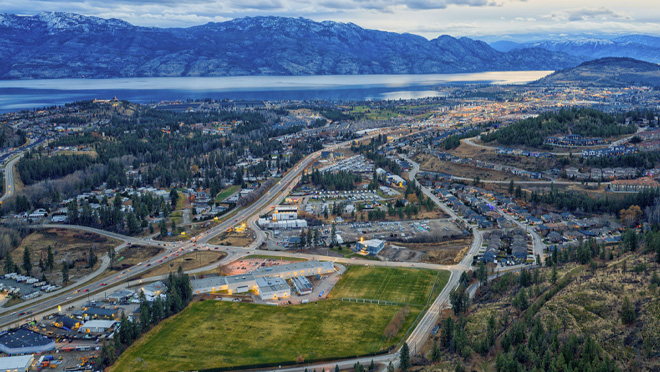West Kelowna Transmission Project

We're strengthening the transmission network that delivers clean, reliable electricity to Westbank First Nation, West Kelowna, Peachland, and surrounding areas.
We'll upgrade Westbank Substation in West Kelowna and build a new transmission line connecting it to FortisBC's Recreation Substation in Kelowna.
What's new
We're hosting open houses in February and March 2026 to hear your feedback on potential route options between West Kelowna and Kelowna, focusing on route options between Westbank Substation on Shannon Lake Road and Highway 97.
Please join us to learn more about the West Kelowna Transmission Project.
In person
Date: Wednesday, February 25, 2026
Time: Anytime between 4 p.m. and 7 p.m.
Location:
Shannon Lake Golf Course
2649 Shannon Lake Rd
West Kelowna, B.C.
V4T 1V6
Virtual attendance
Date: Thursday, March 5, 2026
Time: 6 p.m. to 7:30 p.m.
Please register at projects@bchydro.com by March 3.
We'll hold open houses for other segments of the route later in 2026.
We're planning to interconnect our grid in West Kelowna with FortisBC's network in Kelowna.
This will create a redundant power supply for nearly 26,000 BC Hydro customers in Westbank First Nation, West Kelowna, Peachland, and surrounding communities.
We're identifying a route for the transmission line from Westbank Substation on Shannon Lake Road, across Okanagan Lake, and into Kelowna.
Currently, power to our substation in West Kelowna is supplied by a single 138-kilovolt transmission line from Nicola Substation near Merritt. It runs through rugged, remote terrain that's susceptible to wildfires.
In September 2024, we decided that an interconnection to the FortisBC system in Kelowna is the leading alternative for the West Kelowna Transmission Project.
This alternative, known as 3e, includes a transmission line from Westbank Substation to FortisBC's Recreation Substation in downtown Kelowna.
In coming to this decision, we considered input received through ongoing collaboration with the syilx Okanagan Nation, consultation with stakeholders, and discussions with governments and FortisBC, along with engineering, safety, socio-environmental, and other factors.
Alternative 3e provides several benefits over Alternative 2 (a new transmission line from Nicola Substation to Westbank Substation) including:
- Providing an independent second source of power to Westbank Substation with lower risk of outages due to wildfires;
- Minimizing impacts to syilx Okanagan Nation and other First Nations' traditional territory by building in an urban area;
- Aligning with BC Hydro's Environmental Principles by minimizing habitat loss and fragmentation and eliminating the need for a long linear greenfield development;
- Avoiding the need for a new right-of-way on private ranch lands; and,
- Being able to enter service sooner than other alternatives.
BC Hydro acknowledges our presence on the traditional, ancestral, and unceded tm̓ xʷúlaʔxʷ (land) of the syilx Okanagan Nation.
The West Kelowna Transmission Project is being developed in collaboration with the syilx Okanagan Nation. Through a new relationship model based on mutual respect and collaboration called the Enduring Relationship, BC Hydro is committed to working with the syilx Okanagan Nation on projects within Okanagan territory and to ensuring that impacts to Aboriginal rights and/or title are identified and addressed. Specifically, BC Hydro is working with a Project Review Committee comprised of Okanagan communities and led by Westbank First Nation to better understand and address the environmental, cultural, and socioeconomic impacts of the West Kelowna Transmission Project and to make shared decisions about routing.
The West Kelowna Transmission Project will strengthen and reinforce the transmission network delivering clean, reliable electricity to Westbank First Nation, West Kelowna, Peachland, and surrounding communities.
The project requires a Certificate of Public Necessity and Convenience (CPCN) application to be submitted to the B.C. Utilities Commission (BCUC). Information on the CPCN process is available on the BCUC website.
Environmental studies, including field work, are underway. These include fish and aquatic, wildlife, and archaeological assessments.
These studies are being completed in partnership with the syilx Okanagan Nation and will be used to plan our work to avoid or minimize impacts to sensitive areas.
We're designing the project to avoid habitat fragmentation and habitat loss by using existing corridors, such as roads.
A crossing of Okanagan Lake will be required. We recognize that Okanagan Lake has important cultural and ecological significance and we're taking steps to limit impacts to shoreline and aquatic habitat.
We're studying potential cultural impacts
syilx Okanagan Nation is leading traditional use and socio-economic studies of the project and its proposed routes.
We'll seek to limit the footprint of new infrastructure on communities by using existing utility corridors wherever possible.
We're studying possible route options between West Kelowna and Kelowna and we expect to have identified a leading route option by the end of 2026.
We'll carry out detailed design of the transmission line route, alongside regulatory approvals and permitting, in 2027 and 2028.
Construction could commence as early as 2029.
We've been engaging with stakeholders, discussing the project with all levels of government, and undertaking various studies and assessments throughout project planning. We'll continue these activities as the project advances.
Get in touch
If you'd like to learn more about the project, please contact us at:
Email: projects@bchydro.com
Phone: 604 623 4472
Toll free: 1 866 647 3334
Get email updates
Receive updates and information about the West Kelowna Transmission Project.